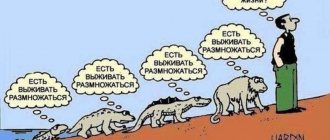Humanity has been talking about the meaning of life since the earliest times of its existence.
Humans are social creatures with a natural instinct for survival. At a basic level, this survival requires eating, drinking, resting, and procreating. It is precisely because of this that the meaning of life at the earliest stage of human existence could lie in the continuation of the process of evolution. But the more conscious people became, the more profound the understanding of their true purpose became for them.
Thanks to intelligence, curiosity, the ability to analyze and reflect, many minds began to increasingly ask the question “What am I living for?”, trying with its help not only to realize themselves, but even to survive in difficult periods.
What is the meaning of life?
Plato once defined man as a bipedal animal without feathers and with broad nails. Later, he gave another definition - “a creature in search of meaning” [Psychology Today, 2018].
The human desire to search for truth, to know oneself and the world around us finds expression in all of its activities. Despite the relative lack of interest in the question of meaning in life among analytic philosophers for much of the twentieth century, the body of work on the topic has grown significantly in the last two decades or so.
In the words of twentieth-century psychoanalyst Bruno Bettelheim, “The greatest need and the most difficult achievement is to find meaning in our lives.” And Holocaust survivor psychiatrist Viktor Frankl said that the human will to meaning precedes either “our will to pleasure or our will to power.”
In short, the meaning of life is what a person lives for and what he strives for throughout his entire conscious age. Its main characteristics are uniqueness, variability depending on a particular life period or circumstances, and compliance with the main life values.
Questions about the search for meaning arise and take shape in various contexts of human activity:
- when trying to make an important decision about what to do with his life;
- when you find yourself trapped in a job you hate;
- when wondering if there is something more than the daily hustle and bustle;
- when he falls ill with an incurable disease;
- when experiencing the loss of family and friends;
- when he feels weak and alone.
Behind many questions about life's purpose lies the human ability to move beyond the usual boundaries, to look at one's life from a broader point of view. Fortunately, humans are conscious and can engage in introspection and self-reflection, moving from mere automatic existence to observation and evaluation.
Quotes about living with meaning are one of the most popular searches on the internet, along with the question of defining purpose. People want to know if they have a purpose, and if so, what it is. Many of them believe that there is some kind of space mission around which life can be ordered.
There are five views on the meaning of life:
- A supernatural view that asserts that the existence of a higher mind, along with a "proper attitude" towards it, is sufficient to ensure a meaningful life.
- Subjective naturalism, according to which the meaning of life varies from person to person and is formed through the achievement of goals set for him.
- Objective naturalism, which asserts that a full life is possible in a purely physical world, devoid of spiritual realities.
- Hybrid naturalism, whose proponents believe that meaning is not present in a life filled with useless activities and vanity. However, it can also be absent when a person participates in worthwhile and objectively valuable projects, provided that he does not put his soul into them.
- Pessimistic naturalism (nihilism) is a point of view that denies the possibility of a fulfilling life, because literally nothing has value.
Some thinkers are confident that the meaning of human life is determined solely by divine providence. Others attribute the main role to the soul, believing that its life continues after the death of the “physical shell.” In addition, there are two camps of “naturalists” who disagree about what is of true value.
Objectivists argue that there are absolute truths that have value, although they may not agree on what they are. For example, some of them say that the meaning of human life lies in creativity, while others believe that only virtue and morality give it true meaning [Quartz, 2018]. Subjectivists consider these views too narrow. If meaning is determined through cognition, then it can come from any number of sources.
For subjectivists, life has meaning, but its value is created by the person himself in his mind and can change over time. People's meaning in life may diminish or disappear as a result of loss of strength or difficult or tragic circumstances. It can also change from one phase of life to another due to personal development, new interests, context, commitments and maturity [Philosophy Now, 2021].
A life with meaning can be assessed from the point of view of its significance for a person at a specific stage of time, even in a very short time. What is valuable and important in one period may lose relevance in a year. For example, the desire to achieve career heights at the very beginning of a young specialist’s professional path may, after a few years, be replaced by his desire to realize himself as a good and responsible parent.
In Philosophy Today, University of London politics professor Tim Bale gives an extremely simple answer: “The point of life is not to be dead.”
Many philosophers offer similar answers. Richard Taylor suggests that it is not effort and achievement that makes life meaningful, but the fact that a person can simply be alive and well. Casey Woodling, a professor of philosophy and religious studies at Coastal Carolina University, suggested that what makes a person's life meaningful is the ability to reflect on how it is lived" [Quartz, 2018].
Achieving goals, work, hobbies, family, financial success - all of this is undoubtedly wonderful, but, according to Woodling, it does not really matter. However, it is worth wondering why people are so eager to get it. “This is close to Socrates’ famous saying that the unexamined life is not worth living,” Woodling writes. “I would venture to say that an unexamined life has no meaning” [Quartz, 2018].
The purpose of man from a philosophical point of view
Perhaps philosophy is the first science that studies what the meaning of life is. But even here there are disputes, since each philosopher has his own point of view, which he is ready to defend.
Philosophers constantly strive for some ideals and create their own models of behavior. The most popular postulates about the meaning of human life are the following:
1. In ancient philosophy there were the following thoughts:
- Aristotle saw the meaning of human life in obtaining happy emotions;
- Epicurus considered the meaning of human life to be pleasure;
- Diogenes saw meaning in life only when it came to peace of mind.
2. In the philosophy of the Middle Ages, when thinking about what the meaning of human life is, they answered this way: this is the study of the lives of descendants and following their examples.
3. But philosophers of the twentieth century saw the meaning of human life in something else. And here too there are disagreements:
- irrationalists believed that the meaning of human life lies in the fight against death and suffering;
- existentialists argued that the meaning of a person’s life depends only on himself;
- and positivists do not consider this a problem as such.
Why does a person need meaning in life?
Living a meaningful life can be talked about in different contexts. It is not reduced to one key goal-principle, but is embodied in significant and defining, albeit derivative, life meanings that reflect the main views and positions of a person [Sociological Research No. 11, 2016].
In Man's Search for Meaning, psychiatrist and neurologist Viktor Frankl wrote about his experiences in a concentration camp during World War II. Frankl discovered that those who survived those inhumane conditions were not those who were physically stronger, but those who maintained a sense of control over the environment and were driven by a specific goal. It was this goal, according to the psychiatrist, that helped people in concentration camps maintain motivation for life and faith in their bright future [Psychology Today, 2018].
Having survived imprisonment and gone through all the horror of Nazi concentration camps, the psychiatrist wrote a book that has become a guide for many people in understanding what the meaning of their lives is. Frankl's purpose, his will to live despite being in the harshest conditions, stemmed from his desire to later write about this experience. The writer noted that other camp survivors also had a specific goal - they were determined to see their families after the war or to help other prisoners live while maintaining a sense of humanity [Quartz, 2018].
Having meaning in life not only helps you get through difficult times, but also has a beneficial effect on people's health. American scientists who conducted a three-year study in which they interviewed 1,042 residents of the city of San Diego aged 21 to 100 years old came to an interesting conclusion. People who have found meaning become much calmer, do not experience stress and other health problems, unlike those who consider their life meaningless [Izvestia, 2019].
Researchers have found that the percentage of people satisfied with life varies significantly across different age groups. The largest number of satisfied with their current condition was among 60-year-old Americans surveyed.
Scientists believe that it is the presence of meaning in life that makes it possible to improve the physical condition of patients and propose using this therapy in medicine [RIA Novosti, 2019].
That is, everyone has their own meaning of life?
Yes, research on the connection between a sense of meaning in life and mental/physical health and well-being shows that it doesn’t matter how you imagine meaning in life, as long as you have it in your life.
As philosopher Simon Blackburn writes in his book Being Good, to answer the question of whether life has meaning, you must first decide for whom: an electron in an atom, a stone on a riverbank, a black hole in the center of the Galaxy, or for you. From a psychological point of view, it is you who are important. Therefore, typical wording in questionnaires on this topic sounds like this: “I understand what the meaning of my life is,” “I have a clear sense of purpose in life,” “I am looking for something that gives me a sense of meaningfulness in life.”
Each item is rated on a scale from “absolutely true” to “absolutely false.” That is, the meaning of life is not only a subjective concept, but also a measurable quantity, essentially an indicator of the meaning that we attach to different areas of our lives and our position in the world. The value can fluctuate and sometimes drops to zero or goes negative, and then a feeling of meaninglessness arises. But the stock price of your life on this exchange depends only on you.
What does “life without meaning” mean?
Some seem to spend their entire lives unfulfilled, constantly searching for purpose. Philosopher Iddo Landau suggests that every person has everything necessary for a full existence. In his opinion, people are mistaken when they feel that life is meaningless. The mistake is based on their inability to understand what is truly important. Instead, they are overly focused on what they believe is missing to exist fully [Quartz, 2018].
“To my surprise, most of the people I talked to about the essence of meaning in life told me that they didn't think their lives were meaningful enough. Many even imagined their lives to be frankly meaningless,” writes the philosopher. “But I often found the reasons my interlocutors gave for their views problematic. Many, I thought, were not asking the appropriate questions that could change their views, or take actions that could improve their condition. Most people who complained about the meaninglessness of life found it difficult to even explain what they meant by this concept” [The Philosophers' Magazine, 2018].
In other words, Landau believes that people who feel like they are living life aimlessly are actually misunderstanding the issue. He became one of many thinkers who, over many centuries, tried to figure out what a meaningful life is (Quartz, 2018).
The opinions of philosophers on this matter are numerous, varied and, to varying degrees, practical. The famous thinker Friedrich Nietzsche, for example, said that this question has no meaning in itself, because in the middle of life a person is not able to determine whether his life has meaning, and it is not possible to go beyond the process of existence to find the answer [ Quartz, 2018].
Iddo Landau believed that anyone who believes that life is meaningless also recognizes the importance of value. In other words, if a person thinks that his life is devoid of any meaning, then he believes that there is such a thing as value [The Philosophers' Magazine, 2018].
Many popular statuses about living with meaning claim that absolutely everyone is able to change the value of their life through practice, effort, action and reflection. The philosopher notes that the world is changeable: people change their place of residence, make acquaintances, gain interesting experience and knowledge, and encounter new ideas. As a person changes, his values change, as well as his goals and meaning in life.
For life to not be meaningless, it does not have to be unique at all. According to Landau, believing that uniqueness is associated with meaning is another mistake that many make. This misconception, in his opinion, “leads some people to unnecessarily consider their lives to be insufficiently meaningful and miss ways to give it meaning” [Quartz, 2018].
Admittedly, this is important in several areas: for example, in creativity, value also depends on originality, since simply repeating what other artists have already created does not make sense.
Likewise, scientific achievements are valued for their originality and innovation. Blindly repeating someone else's conclusions has little value. And this, of course, means that at the time of presentation of scientific results they must be unique.
However, for the most part, uniqueness is not important in determining the meaning of life. Thus, for example, the love between parents and children is valuable not because it is different from the love between other parents and infants, but because of its warmth and emotional closeness.
Thus, focusing on uniqueness is another mistake in defining value. This mistake leads some people to unnecessarily consider their life to be insufficiently meaningful and thereby miss ways to give it meaning.
The presence or, conversely, absence of meaning is determined by the values that are important to a person. Based on them, he determines whether his life is a success or not. For example, parents who have lost their child in a car accident find it difficult to perceive the present reality in the previous context. They may only see meaning in life again if they find other things that they feel are of high enough value (such as having or adopting a child).
Someone begins to consider their existence meaningless because they cannot achieve certain career heights in their work. For such people, the main or only important issue remains achieving excellence in their career. This blinds them to other issues that may be relevant. That is why they begin to feel the purposelessness of their existence.
It is important to note this close relationship between meaningfulness and value because it provides many insights that may be useful for people who feel their lives are not meaningful enough.
People's views on the meaninglessness of life can often be wrong. Some people unfairly believe that they are bad parents, while others incorrectly believe that their parenting methods are perfect. Some people unreasonably think that the art they create is not very good, while others mistakenly believe that they create masterpieces. Someone, for example, underestimates or overestimates their own sense of humor, knowledge, or ability to play a musical instrument.
This type of misjudgment occurs in many areas. This means that the same thing can happen with determining the meaning of life. Surprisingly, many people who consider their lives to be insufficiently meaningful are absolutely sure that this is so. They are convinced that their ideas about this must be accurate and reliable.
Noting that meaning in life is based on values, a person also focuses on bringing it through specific actions. To make your existence more meaningful, you need to improve what is valuable.
You can bring new values into life, increase, re-realize or re-evaluate existing values. Many people, including those who feel like they're wasting their time aimlessly, devote more time and effort in one evening to thinking about which movie to see than to thinking about what could add more meaning to their lives.
Landau argued that meaning is a feeling of significance that everyone determines for themselves independently, based on different aspects - relationships, creativity, achievements in a certain field or generosity and other opportunities [Quartz, 2018].
For those who are concerned about the issue of living life meaninglessly, Iddo Landau suggests rethinking and searching for meaning in other things. So, for example, if a person does not feel meaning in life because he has not been fulfilled in his profession, he should try to find it in his other endeavors, such as relationships, volunteer work, travel or creative activity. Also, according to the philosopher, he should take a closer look at what he is doing - perhaps something significant and valuable is already happening in his life, to which he is not yet paying due attention.
Introduction
Greetings, O inquisitive mind!
Before solving monumental questions a la: “What is the meaning of human life?”, “How to find the meaning of life?” or “Is there a meaning to life at all?”, let’s understand what unites us all. Content
- What is the meaning of human life? About the need for self-realization
- Is there a meaning to life?
- Why was that very meaning invented? Meaningless life is terrible
- Desire to be significant
- Interest in life
- Development
- Life is the meaning of life
- How does a person find meaning?
How to understand your meaning in life?
You can endlessly re-read hundreds of statuses from social networks about the meaning of life, but you can understand what really motivates each of us only by understanding yourself well.
Often, people who have experienced serious trials, such as, for example, an incurable disease, the loss of a loved one, or major bankruptcy, come to an understanding of their own destiny. Having experienced severe stress, they reassessed their values and stopped taking the life given to them for granted. Many of them found themselves in charity and helping those who faced a similar problem [The School of Life, 2021].
Fortunately, to understand the purpose of your existence, you don’t have to wait for bad events to happen. To do this, it is enough to devote a little time to reflection and introspection.
To determine what is truly close and important, you need to understand yourself well. It's worth asking yourself a number of questions :
- What brings me genuine joy?
- Why am I ready to wake up in the morning with pleasure?
- What tasks do I complete while in a state of flow?
- What am I not ready to live without for a day?
- What makes my life worth living?
- At what moments do I realize that I am truly happy?
- If I could do my dream job, what would it be?
It is important that the meaning of a person’s life is correlated with his true values and sincere interest. For example, not everyone cares about medicine or social work. Some people find fulfillment in helping those in need, while others define professional fulfillment or spiritual growth as their highest value.
Meaning for different people can lie in different moments: in supporting a football team, in conquering new mountain peaks, in conscious parenting, in music, in helping others, in finding truth through philosophy, etc. But the characteristic feature of all these examples is a consciousness that is positively and constructively absorbed, involved, expanded and realized [Philosophy Now, 2021].
You can get to know yourself even better using the right techniques and questions in the online Self-Knowledge program. Correct reflection allows you to determine not only the meaning of life, but also to understand your strengths, which will help you realize this meaning. Having found answers to many questions, you realize what is important, close and valuable to you.
While there is no single meaning, each person can live his life in such a way that each day brings him as much satisfaction as possible. As Konrad Lorenz put it: “Life itself is a process of learning.” According to this interpretation of evolution, the essence of life is the pursuit of knowledge: knowledge about the real world, which is constantly tested for relevance to this world [Philosophy Now, 2021].
What works and is in this sense “true” is preserved. Life, according to the scientist, is proven knowledge that has stood the test of geological time. From this perspective, accepting the pursuit of knowledge as a possible meaning in life seems literally a natural choice [Philosophy Now, 2021].
The meaning of human existence. Where are we going and why. New understanding of evolution. Edward Wilson.
The meaning of human existence. Edward Wilson. Email book https://t.me/kudaidem/2252 What is the meaning of life for each of us?
Sociobiologist and two-time Pulitzer Prize winner Edward Wilson addresses the most pressing questions of the 21st century, answering which humanity can understand how to move forward without destroying itself and the planet.
The future of man, who has come a long way of evolution, is now, more than ever, in our hands, the author believes and warns against neglecting the laws of natural selection and being carried away by the ideas of biological intervention in human nature. Turning alternately to natural sciences and humanities, Wilson calls on the scientific world to look for ways to connect these two major branches of knowledge.
This is the only way to get closer to the most difficult riddles - “where are we going?” and, most importantly, “why?”
If representatives of another cosmic race come to us, they:
- will be humanoids;
- are unlikely to want to colonize the Earth;
- most likely, they will not be interested in our technologies.
Edward Wilson, at the age of 84, wrote an interesting book, “The Meaning of Human Existence,” where he spoke about the biological foundations of ideology and considered man as a product of biological and social evolution.
4 reasons to read the review:
- understand what qualities helped people build civilization;
- see how human biological nature manifests itself in today's politics and religion;
- together with a great scientist, fantasize about contact with an extraterrestrial civilization;
- believe in a bright future for humanity.
10 main thoughts of the review.
1. The modern condition of man is the product not only of six thousand years of civilization, but also of a much longer prehistoric time.
2. The key to the development of human civilization was eusociality - the ability to divide labor and organize safe shelters for raising offspring. This ability is shared by only twenty species on the planet, fourteen of which are insects.
3. The formation of complex social behavior began with the emergence of settled life.
4. The evolution of social behavior and the rapid growth of brain volume are associated with two-phase natural selection: individual and group (and not just individual, as supporters of the theory of inclusive variation believe).
5. Two-level competition gives rise to deep internal conflict: on the one hand, within the group, selfish and aggressive individuals are the most successful; on the other hand, for the success of the group as a whole, it is necessary that its members be tightly connected and disposed to mutual support and altruism.
6. Ideologies and religions have deep roots in human biology: as a species, we have an inherent desire to belong to a certain group, to oppose ourselves to members of other groups, to evaluate, compare and seek the meaning of our existence in the outside world.
7. The scientific worldview is based on the conviction: the meaning of human existence lies in its unique ability to make decisions and predict the consequences of its actions.
8. Humanitarian knowledge is our most valuable luggage and a tool that helps us understand our inner nature and use the achievements of science and technology for the benefit of humanity and other species of living beings.
9. Potential aliens from outer space will most likely be humanoids, not interested in colonization or capturing technology - they will be interested exclusively in the humanitarian aspects of earthly civilization.
10. The current state of technology and global threats pose serious questions to humanity, which can only be answered by freeing ourselves from ideological prejudices and taking responsibility for the entire planet.
A book for those who love a combination of scientific arguments with philosophical judgments.
The author, the world's leading expert on ants, really wanted to write a book about ants, since this is his scientific specialization, but no one was particularly interested in this topic. Therefore, he called the book more catchy, but left the content largely the same.
(Humanity in a cosmic perspective)
In the book, Wilson summarized his philosophical positions, developed over decades of active intellectual pursuit and a brilliant scientific career.
Edward Wilson became an expert on ant behavior as a result of an accident: after injuring his eye and undergoing major surgery at the age of eight, the boy was forced to focus his attention on small objects - and "spended more time observing ants and butterflies."
Devoting himself to the study of ants, Wilson not only discovered more than 300 new species of insects, but also laid the foundations of sociobiology , and, fascinated by the problem of the Earth's biodiversity, created the theory of island biogeography , which interprets the patterns of extinction of plants and animals on archipelagos and individual islands.
Wilson, as a biologist and thinker, conceptualizes our species in the context of an infinitely diverse continuum in which humanity has "won the genetic lottery."
Man appears here as a product of biological and social evolution, the vices and weaknesses of civilization are given a genetic explanation, the history of knowledge of oneself and the surrounding world is described as an integral process, in which today another fruitful stage is beginning - the New Enlightenment.
The book makes you look at humanity from two very different angles:
on the one hand, we are just physically imperfect, small creatures inhabiting a peripheral planet in one of the galaxies.
On the other hand, the most powerful species on their home planet, which managed to build a civilization and now must bear responsibility not only for itself, but also for other species inhabiting the Earth.
Wilson analyzes the relationship between the humanities and the natural sciences, talks about the biological foundations of ideology, and explains how and why people have occupied a unique place on the planet.
The key to our success as a species and hope for a brighter future lies in our ability to act together and predict the results of our efforts .
The book will help you rise above everyday life and look with new interest and greater responsibility at your home planet - the source of strength, joy and life itself.
(Deep into evolution, forward into the future).
In ordinary language, “meaning” denotes a goal; a goal presupposes the presence of a plan, and therefore a creator.
All religions are convinced that humanity as a whole and each individual exist for a reason - they have a purpose.
Science, on the other hand, finds meaning in man's very existence, in the sum of causes and effects that gave birth to our species and determine its existence.
Just as an individual human action is understood in everyday terms, our ability to think and make decisions is the justification and raison d'être for humanity as a species.
A person knows how to imagine future scenarios and consciously choose his actions leading to one or another development of events. How exactly we use this subtle instrument depends on how well we understand our nature.
Genetic engineering technology gives a person the opportunity to take on the role of creator.
We can change ourselves at our own whim:
acquire more memory, better vision, outstanding athletic ability, and the ability to live much longer.
The choices are endless - but what should you choose?
we must understand the philosophical meaning of human existence.
After all, we are given only one planet, and the choice we make will affect not only ourselves, but also all the inhabitants of the Earth.
(The mystery of the existence of mankind)
The emergence of complex social behavior in humans followed the same pattern as in other eusocial species - that is, those in which there is a division of labor and reproductive functions , overlapping generations and joint care of offspring.
Eusociality is an extremely rare phenomenon: it is characteristic of only twenty of the hundreds of thousands of species that have inhabited the Earth over the past four hundred thousand years.
Eusociality occurs in fourteen species of insects,
three species of shrimp living in coral reefs and only three species of mammals - two species of rodents and humans themselves.
From an evolutionary perspective, eusociality emerged very late.
Our ancestors also developed for millions of years as one of the branches of primates, without signs of eusociality.
It is clear that this advanced form of social behavior provides significant benefits for the survival of the species.
The total biomass of just twenty genera of eusocial ants exceeds 50% of the weight of all insects on Earth (although there are about a million species).
A necessary step before the emergence of eusociality is the arrangement of a nest for raising offspring and selecting individuals that are engaged in obtaining food.
About 2 million years ago, the distant ancestors of modern humans, the herbivorous australopithecus, began to include high-energy animal foods in their diet.
To obtain this widely scattered resource, hunters had to be selected from all members of the tribe who could hunt far from home while their offspring grew up in safety in the camp.
The organization of the first sites of primitive people gave a powerful impetus to the development of intelligence, since it required the emergence of two mechanisms of interaction at once: competition and cooperation.
people learned to enter into alliances, compete, provide services, betray and deceive, training their memory, using the experience gained and predicting the consequences of their actions.
In the modern world, interaction mechanisms have taken the form of politics, creativity and other highly intellectual activities, which are called “humanitarian knowledge”.
The development of the human brain from 680 cm³ in Homo habilis to 1400 cm³ in Homo sapiens is one of the most rapid episodes of the evolution of complex tissues in the history of the Earth.
Trying to find the reason for this unprecedented leap, biologists have proposed two main concepts to explain why species with complex social behavior are more successful from an evolutionary perspective .
The first, the concept of inclusive variation , suggests that individuals with altruistic tendencies within a group are more successful in spreading their genes, and the group itself, with a predominance of altruists, wins the race for survival due to strong mutual support.
The concept, which emerged in the 1950s, remained popular for about half a century.
The second is a two-stage selection mechanism : individual and group, which is realized through competition and cooperation between individuals and their groups.
Selection begins at the individual stage: genes whose carriers enjoy support from relatives have the greatest chance of spreading.
Based on this community, families grow, and over time the tribe becomes an ensemble of several families, between which a division of labor is formed - this is the stage of group selection.
Eusocial species such as ants demonstrate real miracles in the construction of complex “superorganisms”, where groups of individuals perform strictly assigned roles and neglect the possibility of reproduction and even life itself for the common good of the colony.
Although the concept of inclusive variation had become a dogma by 2000, disseminated, in particular, through bestsellers such as Richard Dawkins's The Selfish Gene, mathematical models built by scientists show that it is erroneous.
the concept of two-stage selection, based on the classical theory of evolution, is tested by mathematics - but the conditions for inclusive variability in nature practically do not exist.
In 2010, Edward Wilson and his co-authors published a paper refuting the concept of inclusive variation.
Wilson's book, Social Competition on Earth, was published in 2012.
Dawkins was unable to refute the mathematical models of Wilson and his co-authors.
The creation of groups not related by common genes is a unique achievement of human evolution. Despite the fact that the similarity of genomes by kinship was an inevitable consequence of the formation of the group, selection by kinship did not become decisive.
The origin of human existence is best explained by natural selection for social interaction:
an inherited tendency to communicate, recognize, evaluate, connect, cooperate, compete, and derive satisfaction from belonging to one's group.
Social intelligence, enhanced by group selection, made Homo sapiens the first completely dominant species in Earth's history.
Our everyday behavior shows how close to human nature the concept of group selection is.
These mechanisms are so deeply rooted in humans that we perceive them as something completely necessary and natural - like water and air. People love rumors and stories from the lives of their own kind - and how could it be otherwise?
Our self-obsession is a tool for increasing social competence.
We constantly share stories, evaluate, compare, classifying ourselves and others into certain groups, or even creating groups that compete with each other in an explicit or implicit manner.
(Internal conflict).
Two-level competition gives rise to deep internal conflict:
on the one hand, within a group, selfish and aggressive individuals are the most successful;
on the other hand, for the success of the group as a whole, it is necessary that its members be tightly connected and disposed to mutual support and altruism.
How to correctly answer the question: are you a lone wolf or a team player?
In search of balance, people create religious and political systems that should help them give existence some higher meaning that protects them from the fear of death.
we can say that ideology is rooted in human nature.
People have gone far from their ancestors, acquired technology, developed imagination and subtle emotions - but remained part of the earth's fauna, closely connected with their home planet.
Our view of history and culture must take these roots into account. The origins of racism, xenophobia, and religious hatred are rooted in a person’s ineradicable biological desire to belong to a group. All other things being equal, people always prefer the company of a person with the same skin color, speaking the same language, professing the same religion.
It is useful to understand that from an evolutionary perspective, these feelings were important for the development of intelligence and social organization in humans as a species.
Sooner or later we will learn to live with our inner conflict and even enjoy it, considering it as the main source of creativity.
(New Enlightenment)
by 1800 the Enlightenment was over. Despite its rapid development, science has not lived up to the hopes of philosophers and has not come much closer to unraveling the mysteries of existence.
The answer to the Enlightenment was romanticism , which switched to the search for the meaning of human life in its inner world.
Since then, the paths of the natural and human sciences have diverged - for more than two centuries they have been developing side by side, but not together.
Natural and exact sciences follow the path of increasingly narrow specialization, which helps to cope with the growing volume of knowledge.
The humanities and liberal arts are producing ever richer and more bizarre fruits.
the time has come for the New Enlightenment , when all areas of human knowledge must once again unite to eliminate the religious and ideological contradictions that torment humanity, and to develop an answer to the key question: why do we exist?
“The best scientists think like poets.”
Science must stop being shy about speaking in the language of metaphors.
Ideology, religion and politics should become the subject of scientific understanding.
The idea of continuum - that is, continuous change simultaneously in two and three dimensions - should spread from physics and chemistry to the humanities.
Man exists on a planet that is only a tiny part of the Galaxy, and in this sense our belonging to the continuum is undeniable.
Biologists see a continuum of Earth's biodiversity, in which hundreds of thousands of species of living organisms simultaneously exist, ranging from bacteria found deep in the Earth's crust to microorganisms of the ocean floor and rarefied layers of the atmosphere.
Increasing our knowledge of the continuum in which we exist allows us to better understand humanity's place in the Universe - the place of a species with very modest capabilities and very great achievements.
Human biological evolution is the result of a complex chain of millions and millions of changes, as unpredictable as it is random.
Cultural evolution, on the contrary, is the product of a single organ - the human mind.
Understanding it requires close acquaintance with people, knowledge of countless human stories, patterns of transformation of phenomena and facts into symbols.
“The humanities are the natural history of culture, our most valuable and most personal heritage.”
Scientific discoveries and technologies are universal.
At the same time, they have their own life cycles.
In contrast, humanitarian knowledge does not become obsolete; it accumulates into the spiritual basis of humanity and directly influences the future we create.
In the coming years, the most significant breakthroughs will likely be made in biotechnology, nanotechnology and robotics .
And they will pose new questions to humanity, which will be impossible to answer without humanists.
The possibilities of changing the genome are increasing, while at the same time, due to migration and the spread of interracial marriages, people's genes are mixed on a planetary scale.
Humanity as a whole is becoming more and more homogeneous, and individual populations are much more diverse than several generations ago.
What will remain for a person when robots take over the bulk of the routine?
What kind of people will we want to be when everyone has the practical ability to get brain implants, muscles of steel, or other superpowers?
The answers depend entirely on the humanitarian sphere, which deals with issues of self-identification and a person’s search for his place in the world.
We are great at developing technology, and let's continue to do so. But at the same time, we will also engage in the humanities, which make us human and will not allow us to pollute the pure source of absolutely unique human potential.”
(Eight Crucial Signs)
our sensory impairment is also a consequence of evolution.
In exchange for a keen sense of smell, exceptional vision and excellent hearing, man received a number of species characteristics that allowed him to occupy a special place on the planet.
Collected together in one being, these characteristics provided us with leadership in communications, the development of abstract thinking, technology and science.
Edward Wilson paints a portrait of an alien creature that can reach Earth - and he is convinced that aliens from other worlds will also be humanoids.
Eight key features that make it possible to build a civilization advanced enough for interplanetary travel:
- land creatures who can handle fire;
- relatively large body;
- audiovisual communication channel - main;
- relatively large head separated from the body with frontally located sensory organs;
- weak or moderately developed jaws and teeth (a developed chewing apparatus is characteristic of species that feed on grass and other low-energy types of food - this type of nutrition does not leave time for the development of intelligence);
- high degree of social organization;
- a small number of free straight limbs;
- morality - without the willingness to sacrifice one’s interests for the sake of a common cause, it is impossible to achieve high results in such a difficult matter as interstellar travel.
The aliens, Wilson is sure, will be much more interested in the humanitarian achievements of the Earth than in the technical ones.
If an extraterrestrial civilization has developed enough to send its envoys on a long interstellar flight, earthlings are unlikely to be able to surprise them with technology.
But the humanitarian sphere, which reveals the essence of man, is truly an original product that can help aliens understand who inhabits the Earth.
Edward Wilson is convinced that potential visitors from outer space will not fly to Earth for the sake of colonization: its risks and difficulties are too great. And if this species brought its own planet to destruction, then its chances of creating viable settlements in another world populated by myriads of alien organisms tend to zero.
Let's proceed from the fact that our planet is the only home and the only chance for survival of humans as a species.
(Man in his house)
The modern human influence on the biosphere is an attack on ourselves.
The main destructive factors are encrypted in the English abbreviation HIPPO:
- Habitat loss - loss of habitats.
- Invasive species - alien species that invade new territories with the help of humans.
- Pollution - pollution.
- Population growth is population growth, causing an increase in the load on the biosphere.
- Overharvesting is the depletion of natural resources due to predatory mining.
We are the only species existing on the planet who can fully appreciate its beauty and have learned to appreciate ourselves.
(Idols of the mind).
Human consciousness is a huge value, but it is necessary to understand that our self-perception is influenced by various superstitions and prejudices, these idols of the mind that cloud the overall picture.
Religions serve to divide and cause intolerance, conflict and war.
At the same time, recent discoveries by neuroscientists show that religiosity is characteristic of humans at the biological level: the same genes that make one react to music are responsible for it.
But who can say that religion is only an innate quality of the species, and separate it from mental constructs, history and the psychological comfort that it gives to believers?
Fortunately, unlike animals, man is not a slave to his instincts: he can consciously control his behavior.
We inherit the ability to choose a behavior scenario from several possible ones and overcome even the strongest instinctive impulses, learning this from other people.
Learning is the key to improving humanity as a species.
Many phobias of modern people are rooted in the deep past.
It is quite natural to be afraid of spiders, snakes, thick water and crowds - after all, these fears helped our distant ancestors avoid danger for millions of years.
But, unfortunately, we have not yet learned to be afraid of cars, junk food and physical inactivity: these factors appeared in the life of mankind too recently.
The driving force of natural selection encourages the convergence of cultures from different parts of the world.
A 1945 study entitled “Human Relations” listed 67 universals that facilitate human interaction: music and sports, body decoration and decorative arts, feasts and folklore, rituals of communication with otherworldly forces and burials of the dead, jokes and prohibitions on incest, hairstyles and rules of property inheritance.
Anthropologists (and real estate agents) know that housing location requirements are nearly ideal in all cultures around the world.
The descendants of the inhabitants of the jungle and the peoples of the desert, without agreement, choose places for their residence on a hill, near water and areas of greenery .
Even where it makes no practical sense.
This is an impressive example of how the learning of many generations of the past is reflected in the behavior of modern people.
The history of science knows many attempts to decompose a person into components, to separate the mind from feelings and genes from the psyche. But they were all barren.
Human nature is a set of hereditary patterns of mental development that guide the direction of cultural evolution and thus connect genes with culture in the brain of each person.
The best path that humanity can choose is to free itself from the illusions and demons that our ancestors feared so much, and take responsibility for the fate of our species and the planet as a whole.
(Lonely and free)
The mystery of consciousness has haunted people for two thousand years.
Only philosophy or poetry can give a comprehensive answer to the riddle of man. This mystery may well be solved.
The amount of knowledge produced by science doubles approximately every ten years.
In addition, human consciousness itself is progressively developing in the course of evolution, which means that tomorrow there may appear an exact answer to those questions that today we are not even able to formulate.
The main incentive for unraveling is the very obsession of people with their own nature; as a species, we never get tired of talking and thinking about ourselves.
Wilson is confident that we are alone in the Universe - or, at least, unattainably far from any intelligent beings that may live in other worlds.
This sad fact nevertheless has a pleasant flip side: being single, we are free and can dispose of ourselves as we want .
The meaning of human existence lies in the future we choose for ourselves and our planet.
We have become the only intelligent species on Earth—and perhaps in our own corner of the Galaxy.
We can make our planet whatever we want.
The problem is that humanity is a very dysfunctional species :
our genetics are increasingly hindering rather than helping in the modern technogenic world.
We cannot establish effective governance beyond a small village level.
Nations are led by aggressive men, ready to force obedience and new resources.
The consciousness of the majority is clouded by religious and national prejudices.
We are passionate about group conflicts.
There is hope that this will be overcome within the lifetime of current generations.
A fair portion of these problems are related to the youth of our civilization - but many, as we have seen, also have a strong biological basis.
Evolution has made man a creature whose emotions change every minute over a very wide spectrum.
In each of us, a hero and a coward, an altruist and an egoist, nobility and baseness coexist.
The instability of emotions, despite all its inconveniences, must be valued as a gift of nature: it is the basis of development, learning and progress.
But we must learn to understand ourselves from both a psychological and evolutionary point of view in order to confidently pave the way to the future of our species.
About the author:
Edward Wilson is a natural scientist and the world's leading authority on ants. Professor at Harvard University, two-time Pulitzer Prize winner.
in 1975, he became the first scientist to try to explain altruism and aggression from an evolutionary point of view, and thus founded a new branch of knowledge - sociobiology.
Edward is convinced that "scientific humanism is the only worldview compatible with science's growing knowledge of the real world and the laws of nature."
Quotes about the meaning of life
Public pages on social networks are replete with a large number of quotes and statements by famous people dedicated to the meaning of life. We have prepared a selection for you in which everyone can find something interesting for themselves:
“The meaning of life doesn’t matter what you attribute to it. The point is to be alive."
Joseph Campbell
“Whoever we are, whatever we make of ourselves, that is all we will ever have, and that, in its deep simplicity, is the meaning of life.”
Philip Appleman
“Our main goal in this life is to help others. And if you can't help them, at least don't hurt them."
Dalai Lama
“There is not one big cosmic meaning for everyone; there is only the meaning that each of us gives to our lives, an individual meaning, an individual plot, like a separate novel, a book for each person.”
Anais Nin
“The true meaning of life is to plant trees whose shade you wouldn’t expect to sit in.”
Nelson Henderson
“The meaning of life is not just to exist, to survive, but to move forward, to rise, to achieve, to win.”
Arnold Schwarzenegger
“Life should be fun, joyful and fulfilling. May each of you be like this."
Jim Henson
“The ultimate goal of the human mind in all its manifestations is to become acquainted with the truth.”
Eliza Farnham
“I am of the opinion that my life belongs to society, and while I live I have the honor of doing what I can for it.”
George Bernard Shaw
“I feel that the ability to care is what gives life its deepest meaning.”
Pablo Casals
“A man born with a talent which he is called to use finds his greatest happiness in its use.”
Johann Wolfgang von Goethe
“Our goal is not to become each other. This means getting to know each other, learning to see the other and respecting him for what he is.”
Hermann Hesse
“Start living right away and consider each day a separate life”
Seneca
“Every moment of your life is infinitely creative, and the universe is infinitely generous. Just make a clear enough request, and whatever your soul desires should come to you."
Mahatma Gandhi
Each of these quotes about the meaning of life illuminates precisely those values that were close to its author.
The meaning of life is determined according to the beliefs that people hold. However, all human belief systems are, to varying degrees, accurate or erroneous in their description of the world. Moreover, belief systems change over time: from generation to generation, from culture to culture, from era to era [Philosophy Now, 2021].
The beliefs held today even by large sections of the population did not exist yesterday and may not exist tomorrow. Therefore, given belief systems, whether religious or secular, are arbitrary, and in order to determine one's purpose, one must abandon these systems. Otherwise, the meaning of life cannot be determined [Philosophy Now, 2021].
Social function of the individual
People depend on each other to satisfy their individual needs. Against this background, communication and interaction between people is established.
A social function is an assignment to a specific person from society. It depends on the characteristics of the distribution of labor: the teacher is responsible for teaching, the physician is responsible for treatment, the entrepreneur is responsible for organizing production.
Sociologists judge the functions of a particular individual not by what he does or intends to do, but by what consequences for society flow from these actions.
If an individual refuses to perform his functions or the results of his activities have a negative meaning, we are talking about dysfunction.
By fulfilling his functions, a person becomes necessary for others. Against the background of the social division of labor, social statuses and roles are formed. “Cells” appear, each of which is responsible for performing an important social function.
How does the process of self-realization work?
If any meaning in life is a way to realize oneself, then we need to understand how the process of human realization itself occurs. It is based on five basic principles, based on which we all live.
Some people are perfectly aware of these principles, which allows them to realize themselves in the most effective way, while others are not aware and still follow the same principles subconsciously, although this approach is much less effective.
Great, the intrigue has been created, time to show the cards.
Development
As soon as a male cell successfully meets a female cell, announcing the beginning of a new life, from that moment the constant development of a person begins in all aspects of life. Especially in the first 15 years, this process is striking; a person visually undergoes serious changes, and intellectually he develops at a gigantic pace. The world is constantly improving, forcing us to develop along with it.
Any human achievement is the result of long development , otherwise we would all be able to produce something brilliant from the first minutes of life without much difficulty, but any truly worthwhile result is achieved in a protracted process of acquiring skills, knowledge and practice. To do anything worthwhile, you need to grow from who you are now.
Search
Needless to say, the most popular resources on the Internet are search engines, in which we all look for information of interest.
Life never becomes unambiguous, understandable or simple for a person precisely because the process of self-realization implies a search, which is impossible if all the information you are looking for is already on hand.
The need to search in an attempt to understand the world maintains our interest in life . Any interest or curiosity that arises in us is a desire to find something, which means we search every day.
Another idea of searching is self-knowledge. Every person is wildly interested in knowing what he is like and what he looks like from the outside.
There is no desire more natural than the desire for knowledge.
Michel de Montaigne
Creation
The ability to create is the greatest privilege of man. Take any citizen who left a mark in history, and you will see that he managed to leave a legacy there because he created something grandiose during his life.
Some of them created brilliant music or a film, some invented the wheel, and some created equality between black and white people.
Creation is the process of building up a piece of land using the tools at hand. It is impossible to realize yourself and at the same time not create anything , because the process of unlocking potential itself involves extracting resources from yourself and investing them in your idea - during the course of these manipulations, the creation of something inevitably occurs.
Service
Probably every child, fed up with the constant intrusion of this world into his life, dreamed of simply being left alone on the planet. We invite you to imagine this picture as vividly as possible.
Imagine that right now there is no one left on the planet, not a single person at all. How long will it be fun for you to stay in such a world? We assure you that it will not be long, and all because each of us needs to serve .
What distinguishes a successful person from the rest? — he shares with the world the best that he has, makes a contribution. What makes a person influential is not his talent or superpowers, but the significant benefit this all brings to other people. A detailed debriefing on the topic of the need to share has already been discussed in the article on the law of equilibrium of the Universe.
The life of an individual has meaning only to the extent that it helps to make the lives of other people more beautiful and noble.
Albert Einstein
The element of service in human life was not invented by chance. Everything on Earth strives for unity, and service is our way of creating unity within our ranks. Only thanks to other people do we have the opportunity to express ourselves and feel our importance. Look at our world, we constantly use someone’s services and each of us provides some services to others. Every person has his environment with which he interacts daily.
Of all the five principles, this is the least obvious, because we have become too distracted by separating ourselves from others and have become disunited. The distance between people is now too great: we have divided the planet into countries, invented religions, subcultures, families, social statuses and a bunch of other factors - all this so that everyone can define themselves in some category. Coming to the idea of serving while in this position is not very easy.
Love
Love is the thrill with which a designer assembles his new car, or the dedication with which a titled athlete trains, or the diligence with which a director makes his film. In this context, “love” can be understood as a hellish and irresistible desire to do something.
Self-realization is a life-long journey; a reactive driving force is needed to be able to travel this path, and love looks great in this role. The inability to do what you love is one of the main reasons why people are lazy.
Without love, nothing can be beautiful, therefore everything that is most essential is always created with love and thanks to love.











